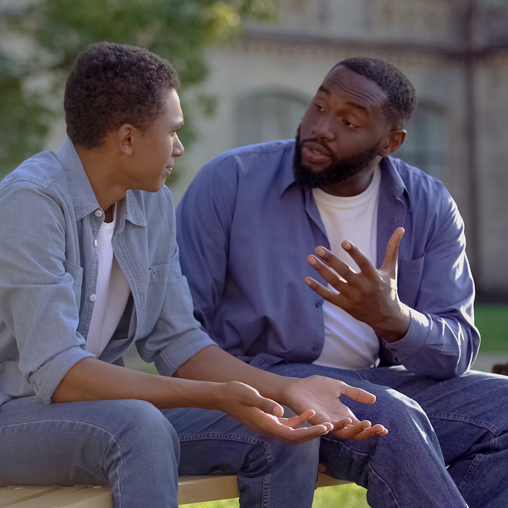
Parenting Potholes
What are the common potholes parents fall into as their kids get older? And what are six things parents can do when they see their children walk away from the faith? Listen as Dave & Ann Wilson, along with Bob Lepine, explain.
Show Notes
About the Guest
-
- Download the entire message with Dave and Ann Wilson.
- Listen to the series "Doing Life With Adult Kids" with Jim Burns. https://www.familylife.com/podcast/series/doing-life-with-your-adult-kids/
- Download FamilyLife's new app! https://www.familylife.com/app/
- Find resources from this podcast at https://shop.familylife.com/Products.aspx?categoryid=130.
- Check out all that's available on the FamilyLife Podcast Network. https://www.familylife.com/familylife-podcast-network/
-

Ann Wilson
Ann Wilson and her husband Dave are hosts of FamilyLife Today®, FamilyLife’s nationally-syndicated radio program. Mother to three grown sons, CJ, Austin, and Cody and wife to one, occasionally grown-up husband, Dave, Ann balances a home life and professional ministry career building both on the grace and goodness of Jesus Christ. Frequently speaking at Kensington Church, a 6-campus church that welcomes more than 14,000 visitors every weekend, and touring across the country at m...more
Bob Lepine
Bob Lepine is the Lead Pastor at Redeemer Community Church in Little Rock, Arkansas which he helped plant in 2008. He also serves on the Board of Directors for the Great Commission Collective, a church planting ministry connecting more than 150 churches world wide. Bob also hosts Mornings on Family Radio, a network of more than 70 radio stations in the US. He is also well known to radio and podcast listeners as the long-time co-host of FamilyLife Today® and as the on-air announcer for Truth...more
Dave Wilson
Dave Wilson and his wife Ann are hosts of FamilyLife Today®, FamilyLife’s nationally-syndicated radio program. Lead pastor, Hall of Fame college quarterback, and nationally-touring speaker, he wears a lot of hats, but it’s his singular passion for enriching lives through spreading the Word and wisdom of God that truly defines Dave. Since attaining his seminary degree, Dave has transformed his passion for sharing the message of Christ and unique nothing’s off limits style in...more
What are the common potholes parents fall into as their kids get older? And what are six things parents can do when they see their children walk away from the faith? Dave & Ann Wilson and Bob Lepine, explain.
Parenting Potholes
Bob: If we’re going to have a good relationship with our kids when they become adults, there’s a transition that has to happen in the teen years. We have to move from being their caretaker to being their coach. Here’s Ann Wilson.
Ann: We called that phase: “The years of living in the question,” where our kids would come and ask a question—like, “Can we do this?” or whatever—and we know what the answer is; the answer will be, “No.”
Dave: “No!”
Ann: But instead of saying, “No,” we would say things like, “Well, tell us about it. You want to go see this movie? Tell us what it is. Tell us all about that.” We would just refrain from saying, “No,” immediately; but we would help them to come to that conclusion. Sometimes, we would just have to say, “No”; but we’d have a conversation, because we’re coaching them.
Bob: This is FamilyLife Today for Tuesday, December 15th. Our hosts are Dave and Ann Wilson; I'm Bob Lepine. You can find us online at FamilyLifeToday.com. If we want our children to thrive as young adults, we have to teach them how to start making choices on their own while they’re still at home. We’ll talk more about that today. Stay with us.
And welcome to FamilyLife Today. Thanks for joining us on the Tuesday edition. I’m thinking a lot of moms and dads are looking forward to having the extended family back together at Christmas time. I think some moms and dads are going, “And it could get tense.” It’s been kind of a tense year with politics and everything that’s going on, so we have to go into this prayerfully and carefully; don’t we?”
Ann: Ooh, that’s good: “prayerfully and carefully.” I think that’s really needed, because it can also be a time of anxiety; because we don’t know what to expect in our conversations.
Dave: I mean, in some ways, obviously, it’s wonderful.
Ann: It’s so fun.
Dave: It’s so great that they can come over or you go over there, but there’s also—you’re tiptoeing around; you’re like, “Don’t talk about this,”—in fact, you say that on the drive over—right?—as a mom and dad, like, “Hey, remember, do not bring this up.”
Ann: Yes; we go to one of our kids’ houses the other day; and Dave’s like, “Okay, so let’s talk about politics.” I’m like, “Let’s not! [Laughter] Let’s not; are you crazy?!”
Bob: “Let’s have a nice time together.”
Ann: Yes.
Dave: I thought we could have an honest conversation, but you know—
Bob: Yes, some things you have to be careful about.
We had an opportunity, the three of us, recently to speak to a number of parents, who have adult kids, about how we navigate this relationship and how we continue to pursue what Ephesians 4:3 says: “Pursue the unity of the Spirit in the bonds of peace,” even when there are secondary things about which we disagree.
We’re going to hear another portion of that presentation today; but before we dive into that, we have a couple of weeks left in 2020. I think a lot of listeners are going, “Yay! Just a couple weeks left!”
Ann: Yes, they’re excited.
Bob: I don’t know that, when we flip the calendar, everything gets fixed; but—[Laughter]
Ann: —but we have new hope, Bob.
Bob: We do; it’s been a challenging year for all of us.
Here, at FamilyLife®, we are praying a lot about the next couple of weeks; because what happens over the next couple of weeks—as our listeners make yearend gifts to FamilyLife—that’s going to determine how much ministry we can do next year and how effective that ministry is going to be.
Dave: Yes; I don’t know if listeners understand that that’s how we do what we do. We have people, like you, that say, “I’m in.” I would just say this: “If you’ve been blessed by FamilyLife in any way, I invite you to be a blessing back.”
Bob: Yes.
Dave: It’s amazing; we have a group of families that’s going to match your donations, up to $2 million, which is just a miracle. Just think, “Whatever you give is sort of doubled; it is doubled” I hope, in all the darkness of this year, we’ve been light, pointing you to Jesus, and helping you, and your family, and your legacy. If that’s true, I hope you join us and say, “I’m going to donate.”
Maybe you’ve never donated before—this will be the first time—and maybe you have many times. We thank you; and we ask you to step up and say: “I want to be a part of this,” and “I want this ministry to keep going,” and “I know I’m a part of that, so I’m going to play my part.”
Ann: We want to help your marriages; we want to help your families; we want to help your kids’ families. We have a lot of things that we want to do; we have a lot of plans that we want to make happen that will really be investments in your family. I really hope/we all really hope that you will join us and help us.
Bob: Well, and again, the good news is that every donation we receive, during the month of December, is matched, dollar for dollar, up to that $2 million-matching gift total. If you can, go to FamilyLifeToday.com and make a donation today; or call 1-800-FL-TODAY. Please be as generous as you can be, because there are others who can’t be generous this year. If you can do a little more, that would be great. Again, our website is FamilyLifeToday.com; or call 1-800-FL-TODAY to make a yearend donation. Thanks, in advance, for whatever you’re able to do.
Dave: Yes.
Bob: Now, we’re going to dive back into a presentation that we made recently to a group of moms and dads, all of whom have adult children, talking about relating to our adult children. We were talking about some of the dos and don’ts/some of the principles we need to keep in mind as we interact with our adult kids.
[Relating to Adult Children Panel]
Dave: If we give advice before they ask for advice—like unsolicited advice—it’s received as criticism; anybody?
Man: Amen!
Dave: Yes; and we’ve learned, “Don’t give advice!”
Ann: —unless we’re asked.
Bob: Yes.
Dave: If they ask, it’s the welcome mat; put it out.
One of our goals is that they’d want to run home when they’re 30 and 40. They’d want to come home, because they feel like it’s a place they’re loved and accepted. There’s a bearing with them, even if they’re not exactly lining up with mom’s and dad’s values and living that way. I tell you—it’s hard to have that patience, because it could be decades.
Ann: One of our boys had a baby. It was their first baby; and he said, “We’re going to give our baby a bath tonight. We didn’t even get any instructions in the hospital.” I was about to say, “I’ll help you! I can help you with that!”—I was about to say—and they said, “We’re just going to watch a YouTube of how to bathe a baby.” [Laughter] I was like, “Oh.” You guys, I just kind of walked out; I was so depressed—like, “I wanted to help!” [Laughter]
I think they wanted to do it all by themselves; they didn’t want me to help. But that’s hard with adult kids.
Bob: Mom’s been replaced by YouTube.
Ann: —YouTube! [Laughter]
Bob: Wow.
Ann: That’s depressing, Bob!
Bob: It is depressing.
Dave: Let’s talk about this: “What are the potholes that trip up parents with adult kids?”
Bob: Well, I think one of the big ones is that parents don’t make the transition comfortably from parents of little kids to parents of teens/to parents of adults. It was a radio guest we had, who talked about this; he said, “When your kids are tiny, you are the caretaker for your kids. That means your job is to keep them alive; they’re depending on you for everything.”
He said, “As they grow older, you move from caretaker to cop, and you follow them around. You write tickets, and you—[Laughter]—you put them in jail for a little while”; right? [Laughter]
Ann: That’s good.
Bob: When they get to be teenagers, if you don’t move from cop to coach, they’re just going to tune you out. You have to move to coach.
You’ve been a coach—and a coach can still pull a guy out of the game and bench him—
Dave: Right.
Bob: —but a coach, most of the time, is not benching people; he’s not being a cop—what’s he doing?
Dave: He’s letting them play. He’s coaching them to the point, where they can do it without him.
Bob: You know they’re going to make a mistake on this play, and you let them make that mistake.
Ann: The great thing about this stage is, still, that we have some control.
Bob: Right; in the coaching.
Ann: —in the coaching phase.
Bob: You can call a time-out; you can pull them out of the game; you can—right.
Listen, you want them to make bad choices and bad mistakes while they’re still living with you, rather than you controlling everything and then they move out, and now they’re making the bad choices/bad mistakes. You have to let your kids go out and do some wrong things and fail.
Ann: We called that phase: “The years of living in the question,” where our kids would come and ask a question—like, “Can we do this?” or whatever—we know what the answer is; the answer will be, “No.”
Dave: “No!”
Ann: But instead of saying, “No,” we would say things like: “Well, tell us about it. You know, you want to go see this movie? Tell us all about that.” We would just refrain from saying, “No,” immediately; but we would help them to come to that conclusion. Sometimes, we would just have to say, “No”; but we’d have a conversation, because we’re coaching them.
Bob: Yes.
The last phase—so it’s caretaker to cop to coach to consultant—with your adult kids, you’re a consultant. Now, if you’re in business as a consultant, you go to somebody and say, “Hey, if we can ever help you out, I’m available. You can hire me”; right? You wait for them to hire you; and then, when they hire you, you come and you say, “Okay, based on my experience, do this, and this, and this.” You write up the report, and you hand it to them. Whether they implement it or not, that’s up to them; you’re the consultant. You don’t come back around and say, “Did you do what I told you to do?”; right? Consultants don’t do that; right?
Dave: I’m just glad one of the Cs was not cosigner. [Laughter]
Bob: No.
Dave: Don’t do that; they’re on their own. [Laughter]
Bob: I think that’s a big trap. As parents, we get so used to being a cop that we don’t know how to transition to coach when they’re in the teen years, or we get so used to being a coach in the teen years that we think we’re still supposed to be coaching them after they’re married. We have to figure out how to transition and how to pull back and let them be the young people that God’s made them to be.
The second thing, I think, is too many of us have our identity wrapped up in how our kids are acting or performing.
Ann: Yes.
Bob: When our kids are making bad choices, we want them to fix it; because it looks bad for us if our friends hear about it. Or when we’re with our friends, and they say, “So how are your kids doing?” we don’t want to say how our kids are doing; because we’re going to think, “They’re going to think we were the worst parents ever, because our kids are doing this kind of stuff!” We think that their behavior is all on us.
Well, my behavior, when I was a teenager and a young adult, wasn’t all on my parents. I was making my own choices, good or bad. It wasn’t what my parents did or didn’t do; it was: “I’m an autonomous, self-functioning human being.” Our kids are going to do the same thing.
We have to find our identity in the fact that we are sons and daughters of God, who are trying to walk faithfully. We mess up; when we mess up, we seek God’s forgiveness. God pours grace on all of that, so we have to find our identity in who we are with Him, not in how our kids are living or performing.
Ann: I don’t know about you, but I’ve seen that we carry more guilt and shame in this area than many others. I don’t know what you have been like as parents; but sometimes, I would go to bed at night and I feel that shame or guilt; I wonder, “Have I done something?” or “What did Dave do that did this?” [Laughter]
Dave: I never go to bed, worried about any of that!
Ann: You don’t, actually. [Laughter]
I also think there’s a spiritual battle that goes on in the midst of that as well, where we have an enemy. He’s called the accuser, and he’s always whispering those lies in our head, that: “It’s your fault. You didn’t do enough.” I’m glad that we have a Father God, who’s the one that is continually loving, caring for, pushing for, and rescuing our kids.
Bob: I think the third trap a lot of us fall into, when our kids get married, is we don’t let them leave. The Bible says, “A man shall leave his father and mother and cleave to his wife.” There’s a new union that got formed; and if there is ongoing emotional dependence on you/financial dependence on you—if you’re not giving them the space to form an “us”—you’re interfering. Dan Allender, who’s a counselor and author, who we’ve had on FamilyLife Today, made a shocking statement early on; I’ve never forgotten it. He said, “Ninety percent of marital problems that I’m dealing with can be traced back to a failure to leave father and mother.”
Now, he’s not talking about just moving out; he’s saying the daughter is still emotionally dependent on how her mom’s going to view this, or the son is still concerned about what his parents will think. There’s still the emotional attachment and dependence. We have to be the ones, who are the adults here, and say, “You need to leave.” Some of us are still drawing too much of our own life from how our kids are doing, and we need to let them have space, and let them live their own lives.
I think these three things are kind of the pitfalls/the traps we fall into.
Ann: Okay; I have a question for you with that area, since you’re our expert. What if the wife has a harder time letting go of those adult kids and is wanting to: “Let’s give them money; let’s do that,” and the husband’s saying, “No, we need to just let them go.” What about that conflict between the two of them? Sometimes, as parents, we’re on different pages with that.
Bob: Sometimes, they’re so needy that they’re drawing too much life from it. Sometimes, it is: “Who wants to see your kid suffer?” “Who wants to see your kids go through hard times?” Let me ask you a question: “When have you grown the most, spiritually, in your lives?”
Ann: Yes; so good.
Bob: When you’ve gone through hard times and when you’ve suffered! Jesus meets you there; you learn how to draw life from Him/how to grow with Him. A lot of parents are short-circuiting their kids’ spiritual growth by stepping in to try to cushion. They need to have some hard times; they need to suffer. They need to face financial challenges and not get bailed out all the time.
Ann: Oh!
Bob: They need to face some—
Ann: Oh, and I agree with everything you’ve said; it’s just really hard.
Bob: It is really hard.
Ann: Yes.
Bob: Who wants to feel that way? But if we can pull back and go, “God’s there; God’s meeting them. God’s doing a work in their life in the midst of this,” and teach them how to grow up and respond.
There are times you’re going to help out; there are times we’ve helped out with our kids, but we’ve tried to be really smart and prayerful about when those times are, and not just make it the default, “Oh, you have a need? Here; we can help you.”
Dave: Yes; I know for me—I bet all of us could say this—the most growth happened in my life through the hardest times.
Ann: Yes.
Dave: My mom, bless her heart, didn’t step in. I thought she was a bad mom—
Bob: Yes.
Dave: —you know—“Where were you?” We think God’s a bad God that He’s not bailing us out. And He does, but He it’s not always the way we want. We grow, and it’s the best that ever happened.
But it’s hard; isn’t it?—because you want to rush in; you want to save the day. I love what Jim Burns says—one of his principles about adult kids is they will never know how far the town is if you carry them on your back, so you have to let them walk their own journey. One day, they’ll be thanking you for it.
Bob: We know that some of you here—your kids are at different places in terms of how you interact with them, where they are spiritually—so let’s talk about what you do if you have kids, who have completely walked away from the faith. Maybe they never embraced it in the first place.
I think the first thing you have to ask is: “How did the father of the prodigal son relate to his son when he wandered off into the far country?” We don’t know everything about what he did, but we know that he did not put up any barriers to his son ever coming back home. When he saw his son starting to move in that direction, he ran to him. He didn’t go out and chase him out of the far country/didn’t go out and pull him out of the pigsty. He waited; he trusted; he prayed—we presume—in the midst of all of this; and he was ready when his son came back. Of course, when he came back, he lavished grace on his son rather than lavishing shame on his son for all the things he’d done.
Phil Waldrep wrote a book, Principles for Getting Your Son or Daughter Back to God, if you have a prodigal. Here were his six [principles]. First of all: “You have to learn to live guilt-free in your Christian life.” As parents, we beat ourselves up: “I have a prodigal; it’s because I didn’t do this as a parent or that as a parent.” God has prodigals; the first two in the garden were prodigals. We are prodigals, so you have to learn to live guilt-free; don’t embrace the shame.
Number two: “You have to ask your prodigal for forgiveness for things you’ve done.” You have to find a way to humble yourself and go, “What did I do or not do that I should have done?” Try to get time with that prodigal and say, “I just want to confess some things or ask your forgiveness for things I should have done or didn’t do.”
Ann: I think that’s really good. I think to ask our adult kids, “Is there anything that I’m doing that is really hurting you or bothering you?” I think that’s a very humble question.
Bob: It is a humble question.
Number three: “You must love your prodigal unconditionally.” Even when they’re in the far country, you have to love them. That doesn’t mean that you prop them up or that you support their sin; but it means that you love that child unconditionally, faithfully, over and over again.
Number four: “You have to allow sin to run its course.” They have to get to the pigsty before they get out—not always; sometimes God will rescue them before that—right? But you have to let sin run its course; you have to guard your words, and then you have to pray for your prodigal. I think, if this is what you have, this is how you care for them.
John Piper has been open in talking about the fact that one of his sons was often in the far country for a period of time. I remember, when we interviewed him, he said, “I prayed for my son every day.” He said, “I sent him just a short email every day: ‘I want you to know I love you; I’m thinking about you. I’m praying for you today.’ I might include something other than that, just a thought.” He said, “I went for years with no response to that, but I just sent the email every day; and just said, ‘I want you to know…‘” He said, when his son came back he said, “I read every one of those, but I never responded. I wasn’t in a place to respond.”
Your kids might respond and say, “Quit sending me those emails.” If they do, you quit sending the emails; right?
Dave: Yes.
Bob: For some of us, we have prodigals, who it’s clear; some of us/we’ve got kids, who profess faith, but don’t live it; right? These are kids, who would say, “Oh yes, I’m a Christian,” but you know that the moral choices they’re making—maybe their language, maybe the way they interact with other people—you just say, “I don’t know that they’re really Christians.” Let me just say this: “They may not be.” Don’t presume that they’re not genuinely saved and just living apart from the Lord; but don’t presume that they are just because they prayed a prayer once, or just because they say, you know, “I’m grateful for the man upstairs.” In fact, if that’s what they say, you can probably wonder if they even know who’s up there; right?
Be aware of: “What’s the fruit you see in their life?” Here’s the thing I would say: “Just keep sharing the gospel with them.” By that—not: “This is what you need to pray to get saved,”—when I say, “…share the gospel,” I say, “Keep reminding them of the goodness of God demonstrated in the death and resurrection of Jesus.” I need to hear that message over and over again in my life; whether you’re saved or not, that’s the message of life for all of us.
I’d go back to your kids, and I’d just keep talking about—you know, they say, “Yes, I’m grateful for the Lord,”—I’d just say, “I’m grateful for the fact that He gave His Son to die on a cross for us, and then His Son was raised again from the dead, and we have the power to live completely different lives as a result of that. Isn’t that great news?” I’d just keep repeating that over and over again until the gospel breaks through; and all of a sudden, they either re-believe it or they believe it for the first time.
Dave: I think we all know this, but I think it’s just as important—maybe more important—to live it, not just say it.
Bob: Yes; right.
Dave: I think it was St. Augustine—right?—who said, “Share the gospel at all times; and sometimes, use words”?
Bob: Yes.
Dave: They’re watching; and they’re looking for and hoping for humility, and grace, and bearing with one another—all the things we talk about in Ephesians 4. When they see that, I don’t know anybody not drawn to that.
[Studio]
Bob: Well, again, we’ve been listening to a conversation we had, not long ago, with a group of moms and dads/parents of adult kids about how we navigate our relationships with our adult children. Some of those relationships can be hard, especially if our kids—if they’re not in a good place, spiritually—either they’ve totally abandoned the faith or they’re living nominal lives as Christians. That’s a hard thing for parents. We have to keep praying; and we have to keep sharing the gospel; and we have to keep living lives of integrity as we just said; right?
Dave: I mean, it’s obviously one of the hardest things. You’re on your knees—I mean, you think that’s going to end at some point—you know, they’re a baby, and you’re praying; and then they get their driver’s licenses—it never ends! You’re still praying.
Ann: I feel like I’m praying more these days—
Dave: Yes.
Ann: —yes—even with our grandkids. Yes; there’s so much at stake, and we are living in a time when it’s ever more important.
Bob: This workshop that the three of us did is available/the audio is available for download. You can go to our website, FamilyLifeToday.com, and download the entire presentation if you’d like.
We also have a link to a couple of podcasts we did—I think we did three episodes with Jim Burns, who wrote a book called Doing Life with Your Adult Children: Keep Your Mouth Shut and the Welcome Mat Out—there’s a link to those podcasts on our website as well. Of course, Jim’s book is available in our FamilyLife Today Resource Center; so you can order the book from us online. Our website, again, is FamilyLifeToday.com for links to all of these resources. You can also call us to order Jim’s book. The number to call is 1-800-FL-TODAY—1-800-358-6329—that’s 1-800-“F” as in family, “L” as in life, and then the word, “TODAY.”
Now, we mentioned this earlier; but please be praying for us, here, at FamilyLife. We still have a ways to go to take full advantage of the $2 million-matching gift offer that’s been made to us, here, at FamilyLife during the month of December. We’re asking FamilyLife Today listeners to be as generous as you can be in making a yearend donation. When you make your donation, it’s going to be matched, dollar for dollar, up to a total of $2 million. We still have a ways to go, so pray that we would be able to take full advantage of all of the funds in this matching-gift fund.
If you’re able to make a yearend donation, we’d love to have you get in touch with us. In fact, we know there are some listeners, who this year, simply can’t donate at the end of the year. We understand that, so we’re asking those who can: “Maybe do a little extra this year to help out those who can’t pitch in.”
When you make a donation, we’re going to send you, as a thank-you gift, two items. We’ll send you a copy of my book, Love Like You Mean It, that is all about what we can learn from the biblical definition of love found in 1 Corinthians 13—how we apply that in our marriage relationship—and we’ll send you a flash drive that has more than a hundred of the top FamilyLife Today radio programs from the last 28 years—programs that deal with marriage-related issues, parenting, all kinds of relationship issues; some great stories/great guests over the years. We’ll hear from Dennis and Barbara Rainey, Dave and Ann Wilson; it’s just a great collection of the top programs from the last
28 years.
The book and the flash drive are our gift to you when you make a yearend donation. Do it online at FamilyLifeToday.com, or call 1-800-FL-TODAY to donate. We’re grateful for your participation and grateful for your prayers as well. Thank you.
We hope you can join us again tomorrow when we’re going to talk about those hot-potato subjects/those subjects that maybe it’s just better that we don’t bring them up when we’re talking with our adult kids. How do we deal with those kinds of issues? We’ll talk more about that tomorrow. I hope you can tune in.
I want to thank our engineer today, Keith Lynch, along with our entire broadcast production team. On behalf of our hosts, Dave and Ann Wilson, I’m Bob Lepine. We will see you back next time for another edition of FamilyLife Today.
FamilyLife Today is a production of FamilyLife of Little Rock, Arkansas; a Cru® Ministry. Help for today. Hope for tomorrow.
We are so happy to provide these transcripts to you. However, there is a cost to produce them for our website. If you’ve benefited from the broadcast transcripts, would you consider donating today to help defray the costs?
Copyright © 2020 FamilyLife. All rights reserved.
1
Episodes in this Series

Maintaining Hope When Your Kids Leave the Faith


